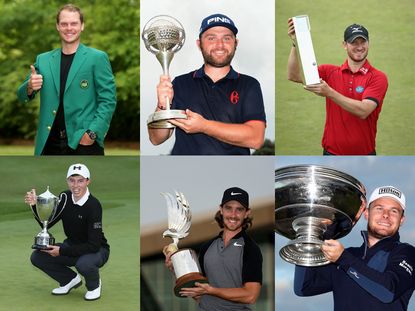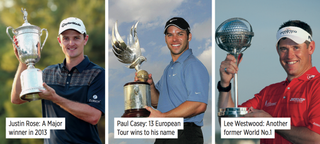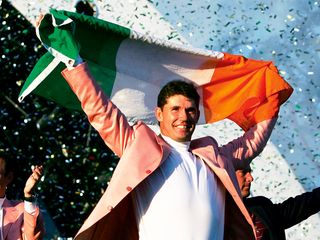A New Golden Age For English Golf
With six Englishmen aged 30 or under in the world top 60, the future looks rosy. But why so many at once? Fergus Bisset investigates…


With six Englishmen aged 30 or under in the world top 60, the future looks rosy. But why so many at once? Fergus Bisset investigates…
A New Golden Age For English Golf?
Twenty years ago there were just four English players in the top 100 on the Official World Golf Ranking.
That number has grown steadily to a point where there are now 13 Englishmen inside the world’s top 100. Some of these 13 – players like Justin Rose, Lee Westwood, Paul Casey and Luke Donald – are long- established at the top of the game, but a new wave of young English players has been surging up the rankings too in recent years.

Related: Justin Rose Targets The Open At Royal Birkdale
Players like Danny Willett, Tyrrell Hatton, Matt Fitzpatrick, Tommy Fleetwood, Chris Wood and Andy Sullivan have emerged to challenge the very best in the world.
Why have so many come along at the same time?
Get the Golf Monthly Newsletter
Subscribe to the Golf Monthly newsletter to stay up to date with all the latest tour news, equipment news, reviews, head-to-heads and buyer’s guides from our team of experienced experts.
The root of current English successes can be traced back three decades. When Nick Faldo won five of his six Majors in the space of five years between 1987 and 1992, golf was headline news in England. Public interest in Faldo’s success directly or indirectly inspired youngsters to take up, and improve at, the game; to strive towards their own feats of excellence.
Westwood, Casey, Donald, Rose and Ian Poulter have all scaled great heights. Now, that new generation of Willett, Hatton et al have grown up watching the likes of Westy, Poults and Luke in the limelight, and seen something to aspire to.

“Having those players to look up to as role models has been a big inspiration for these guys,” says Nigel Edwards, England Golf’s performance director. A legend of the amateur game, Edwards played in four Walker Cups and was team captain in a further three.
“The youngsters will have a chance to play with these more experienced players and it will give them great confidence that they can emulate their achievements.”
How have these youngsters been supported?
Hugely significant to the recent English success story has been the work done by England Golf. With investment from the National Lottery, Sport England and England’s golf club members, England Golf has been able to implement a development programme that has given young players the very best in terms of coaching, competitive exposure and all-round support.
Related: Scottish Golfers Turning Pro Will Receive Funding
Success in elite sport does cost money. There’s no getting away from that,” says Edwards. “I can’t stress enough how important the investment has been, and we will continue to do our best to direct it in such a way as to keep producing successful players by giving them the best playing and coaching facilities available.”

Edwards says that the development of these young English players has been a process from club level upwards. “Each and every one of the successful young English players will have a story to tell along the lines of having a great experience at club, county, regional or national level,” he says. “There will have been a considerable number of people who have contributed over the years.”
How have these players fed off each other's success?
There’s certainly an element of young English golfers feeding off each other’s successes too. If one enjoys good results, the others will feel they are capable of achieving the same.
“If you look across sport, there are cases of people being driven forward by the achievements of their peers,” Edwards points out. “In golf, look at the success of Irish and Northern Irish players in recent years, with the likes of Padraig Harrington, Graeme McDowell, Rory McIlroy, Shane Lowry and Darren Clarke.”

For golfers, the route to success isn’t set in stone; each player will develop at a different rate and each should choose a path to suit their needs. It’s key to allow a player to blossom in a way that works for them.
The reasons, then, for the success of this current group of young English players are many and varied: they have received inspiration from more experienced countrymen who have achieved at the highest level.
Expand Putting tips: Danny Willett

Danny Willett talks us through how to improve…
Major Achievements by English Golfers:
Luke Donald: World No.1 for 56 weeks in total Justin Rose: A Major winner in 2013, 2016 Olympic Champion Paul Casey: 13 European Tour wins to his name Danny Willett: 2016 Masters Champion Lee Westwood: Another former World No.1
They have benefited from tremendous support, coaching and playing experiences tailored to their needs by England Golf; they have fed off one another’s achievements; but, above all, they have shown tremendous drive and dedication to excel in one of the most complex and competitive sports there is.
It’s an exciting time right now for golf in England.

Fergus is Golf Monthly's resident expert on the history of the game and has written extensively on that subject. He is a golf obsessive and 1-handicapper. Growing up in the North East of Scotland, golf runs through his veins and his passion for the sport was bolstered during his time at St Andrews university studying history. He went on to earn a post graduate diploma from the London School of Journalism. Fergus has worked for Golf Monthly since 2004 and has written two books on the game; "Great Golf Debates" together with Jezz Ellwood of Golf Monthly and the history section of "The Ultimate Golf Book" together with Neil Tappin , also of Golf Monthly.
Fergus once shanked a ball from just over Granny Clark's Wynd on the 18th of the Old Course that struck the St Andrews Golf Club and rebounded into the Valley of Sin, from where he saved par. Who says there's no golfing god?
-
 'Gator Netting Is In Place' - Chevron Championship Venue Prepared For 'Safe' Winner's Jump
'Gator Netting Is In Place' - Chevron Championship Venue Prepared For 'Safe' Winner's JumpA tradition which began at the tournament's previous home could continue this year - if the champion is feeling brave enough...
By Jonny Leighfield Published
-
 New Balance 997 SL Golf Shoe Review
New Balance 997 SL Golf Shoe ReviewNew Balance produce some extremely stylish footwear and, in this review, Matt Cradock takes their spikeless 997 SL onto the course
By Matt Cradock Published